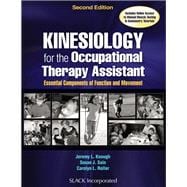
Kinesiology for the Occupational Therapy Assistant Essential Components of Function and Movement
- ISBN13: 9781630912741
- ISBN10: 1630912743
- Edition: 2nd
- Format: Workbook
- Copyright: 2017-08-15
- Publisher: Slack Incorporated
-
Your order must be $35 or more to qualify for free economy shipping. Bulk sales, PO's, Marketplace items, eBooks and apparel do not qualify for this offer.








